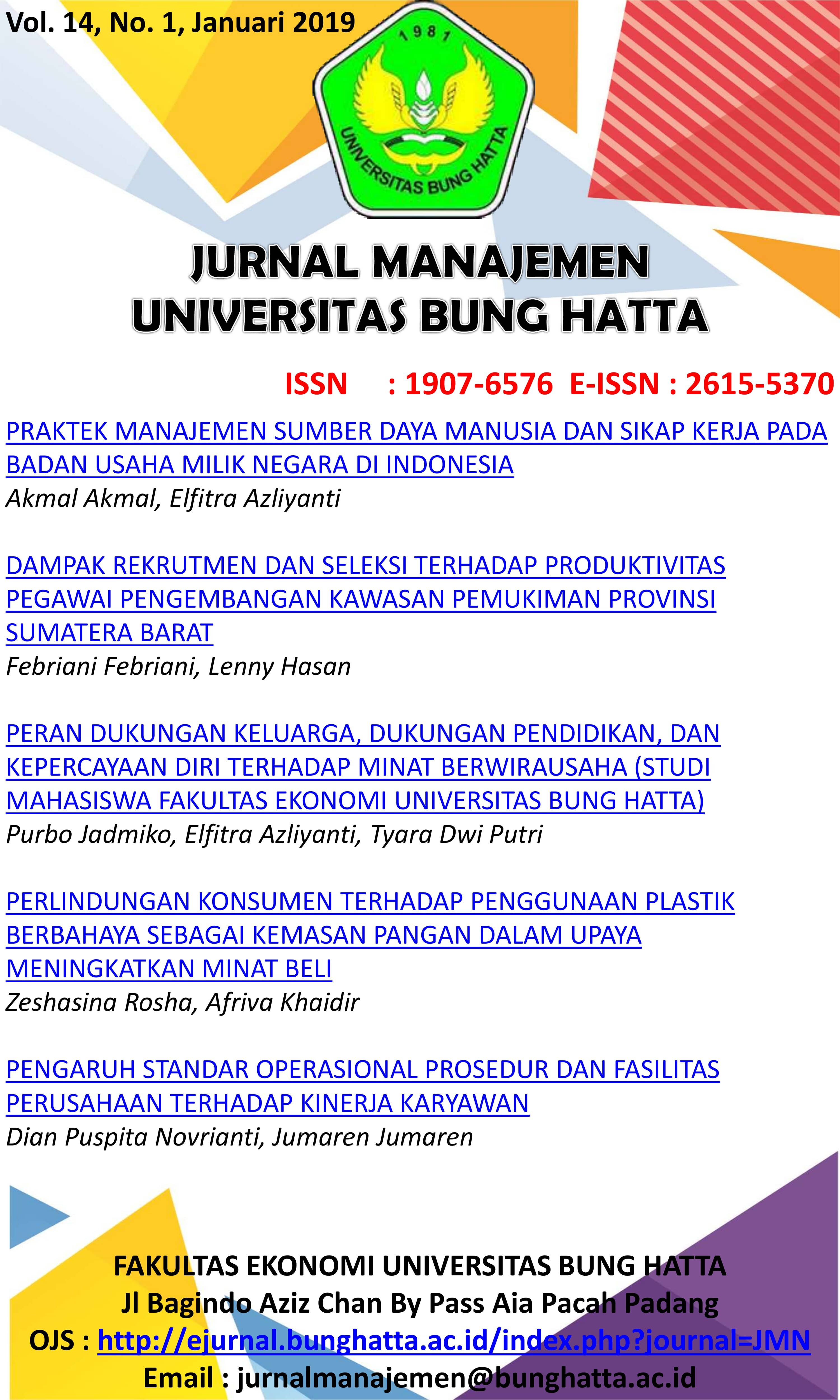PERAN DUKUNGAN KELUARGA, DUKUNGAN PENDIDIKAN, DAN KEPERCAYAAN DIRI TERHADAP MINAT BERWIRAUSAHA (STUDI MAHASISWA FAKULTAS EKONOMI UNIVERSITAS BUNG HATTA)
DOI:
https://doi.org/10.37301/jmubh.v14i1.13875Abstract
Quantitative research design was used to analyze the effect between variables of the study. Fucos research is to identify and analyse the role of perceived educational support, perceived family support against entrepreneur intention on Faculty of Economics University of Bung Hatta fields (160 respondents with the method purposive sampling) data analysis using the method of linier regression analysis to test hypotesis. The results showed that the perceived family support and self-confidence is positive and significant effect against the entrepreneur intention, whereas the perceived educational support is not supported. The discussion and research that will come under discussion on this research.
References
Adhitama, P.P. 2014. Faktor-faktor yang Mempengaruhi Minat Berwirausaha (Studi Kasus Mahasiswa Fakultas Ekonomika dan Bisnis UNDIP, Semarang). Skripsi. Fakultas Ekonomi UNDIP, Semarang.
Cooper, D. R., & Schindler, P. S. 2011. Business Research Methods.11 ed. McGraw-Hill International Edition.
Davidsson, P. 1995. Determinants of entrepreneurial intentions. Rent IX. Workshop, Piacenza, Italy.
Farzier & Niehm, 2008. An assessment of the entrepreneurial intentions of college students majoring in Family and Consumer Sciences.
Hair, J. F. Jr., Black, W. C., Babin, B. J., & Anderson, R. E. 2010. Multivariate data analysis. 7th ed. Upper Saddle River, NJ: Prentice Hall.
Hisrich, D.R & Peter, P.M. 2002. Entrepreneurship. 5th Edition. Edition Mcgraw-Hill College
Ho, T. S. and Koh, H. C. 1992, “Differences in psychological characteristics between entrepreneurially inclined and non-entrepreneurially inclined accounting graduates in Singapore”, Entrepreneurship, Innovation and Change: An InternationalJournal, 1, 243-254.
Kourilsky, M.L. & Walstad, W.B. 1998. Entrepre-neurship and Female Youth: Knowledge, Attitudes, Gender Differences and Educational Practices. Journal of Business Venturing, 13(1): 77-88.
Kram, E.K. 1983. Phases of the mentor relationship. The Academy of Management Journal, Vol. 26, No. 4, pp. 608-625.
Lindenfield, G. (1994). Mendidik anak agar percaya diri.Jakarta : Arcan.
Listiyani,Dewi. 2010.Pengaruh Motivasi Wirausaha Dan Mental Wirausaha TerhadapMahasiswa Menjadi Wirausaha Muda ( Study Kasus MahasiswaFakultas Ekonomi Dan Bisnis Islam (Febi) Angkatan 2010 Universitas Islam Negri Walisongo Semarang).
Maulida, Siti, R. Dan Dhania, Dhini, R. 2012. Hubungan antara Kepercayaan diri dan dukungan orang Tua dengan Motivasi berwirausaha Pada Siswa SMK. Jurnal Psikologi Undip, Vol. 11, No.2.
Pebi Ardiyani, Ni Putu dan A.A.G. Agung Artha Kusuma. 2016. Pengaruh Sikap, Pendidikan dan Lingkungan Keluarga terhadap Minat Berwirausaha. Bali: Fakultas Ekonomi dan Bisnis Universitas Pendidikan Ganesha.
Rogoff G & Heck. R.K.Z. 2003. Evolving research in entrepreneurship and family business: Recognizing family as the oxygen that feeds the fire of entrepreneurship. Journal of Business Venturing, 18(5):559–566, 2003.
Shapero, A. and Sokol, L. 1982 The social dimensions of entrepreneurship. In C.Kent, D. Sexton and K. Vesper, (Eds.), Encyclopaedia of entrepreneurship, 72-90.
Siska, Sudardjo & Purnamaningsih E.H. (2003). Kepercayaan Diri dan Kecemasan Komunikasi Interpersonal pada Mahasiswa. Jurnal Psikologi, Nomor 2
Sondari, M. C. 2010. Mendorong pilihan karir berwira usaha pada mahasiswa guna mengentaskan pengangguran terdidik di Indonesia. (http://pustaka.unpad.ac.id/wp-content/uploads/2010/06/hubungan_antara_pelaksanaan_mata_kuliah_kewirausahaan.pdf) diakses pada 28 Januari 2019 Pukul 6:42
Suhartini, Y. 2001. “Analisis Faktor-faktor yang Mempengaruhi Minat Mahasiswa dalam berwiraswasta (Studi Pada Mahasiswa Univer-sitas PGRI Yogyakarta).” Jurnal Akmenika UPY, Volume 7, tahun 2011, pp: 38-59.
Suryana. 2000. Ekonomi Pembangunan: Problematika dan Pendekatan, Jakarta: Salemba Empat.
Turker, D.and Selcuk,S. 2008 in Turkey , “Which factors affect entrepreneurial intention of university students?”, in Turkey , Journal of European Industrial Training, Vol. 33 No. 2, 2009 pp. 142-159.
Zimmerer, W.T. 2002. Essentials of Entrepreneurship and Small Business Management.Third Edition. New york: Prentice-Hall.
Data Badan Pusat Statistik (BPS) Tahun 2016www.bps.go.id
Downloads
Published
Issue
Section
License
Copyright (c) 2020 Purbo Jadmiko, Elfitra Azliyanti, Tyara Dwi Putri

This work is licensed under a Creative Commons Attribution-ShareAlike 4.0 International License.
Authors who publish with Jurnal Manajemen Universitas Bung Hatta agree to the following terms:
- Authors retain copyright and grant the journal right of first publication with the work simultaneously licensed under a Creative Creative Commons Attribution-ShareAlike 4.0 International License that allows others to share the work with an acknowledgement of the work's authorship and initial publication in Jurnal Manajemen Universitas Bung Hatta.
- The author holds the copyright of the submitted and published articles, with the understanding that articles are disseminated under the Creative Commons Attribution-ShareAlike 4.0 International License..
- The editor team is entitled to do the editing in accordance with the guidelines for writing or template in the Jurnal Manajemen Universitas Bung Hatta.
This work is licensed under a Creative Commons Attribution-ShareAlike 4.0 International License.












